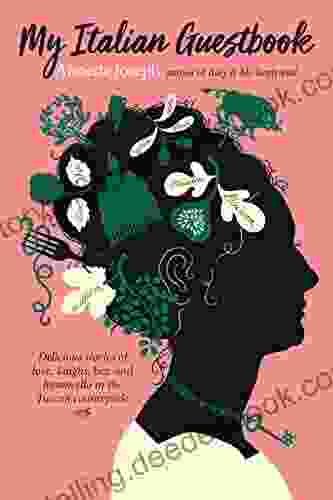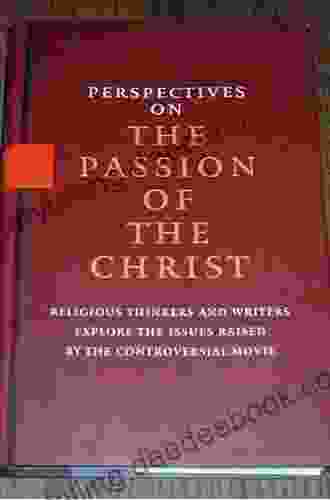Perspectives on the Passions: Exploring the Nature of Emotions and Desires

4.6 out of 5
| Language | : | English |
| File size | : | 5473 KB |
| Text-to-Speech | : | Enabled |
| Enhanced typesetting | : | Enabled |
| Print length | : | 332 pages |
| Lending | : | Enabled |
| Screen Reader | : | Supported |
Throughout history, philosophers and psychologists have grappled with the enigmatic nature of human emotions and desires, collectively referred to as the passions. These powerful forces shape our thoughts, behaviors, and relationships, influencing our overall well-being and societal dynamics. In this article, we delve into the diverse perspectives on the passions, exploring their origins, manifestations, and the profound impact they have on human existence.
Ancient Perspectives: From Reason to Emotion
Ancient Greek philosophers were among the first to explore the nature of the passions. Plato, in his influential work "The Republic," argued that reason should reign supreme over emotions. He believed that the passions, if left unchecked, could lead to irrationality and undermine ethical conduct. Aristotle, on the other hand, took a more nuanced approach, recognizing the importance of emotions in human life.
Aristotle categorized emotions into three main types: appetitive (desires),spirited (anger, courage),and rational (intellect). He believed that the passions could be either beneficial or harmful, depending on how they were managed. When emotions were excessive or misdirected, they could lead to negative consequences. However, when emotions were balanced and aligned with reason, they could enhance human experience and promote flourishing.
Christian Perspectives: The Battle for the Soul
With the advent of Christianity, the concept of the passions took on a new dimension. Christian theologians viewed the passions as a source of temptation and sin, a battleground between the divine and the human. Saint Augustine, an influential early Christian philosopher, argued that the passions were inherently evil and must be suppressed through rigorous asceticism.
However, other Christian thinkers, such as Thomas Aquinas, adopted a more moderate view. Aquinas believed that the passions were not inherently evil but could become so when they were disordered or excessive. He emphasized the importance of cultivating virtue and using reason to guide the passions towards positive ends.
Modern Perspectives: The Rise of Psychology
The 19th century witnessed the emergence of modern psychology, which brought new scientific approaches to understanding the passions. William James, one of the founders of psychology, defined emotions as subjective experiences that play a crucial role in guiding behavior. He believed that emotions were adaptive mechanisms that evolved to help humans respond to their environment.
Sigmund Freud, the father of psychoanalysis, explored the unconscious roots of the passions. He argued that repressed desires and conflicts drive many of our emotions and behaviors. Freud believed that understanding these unconscious forces could help individuals gain insight into their emotional lives and resolve inner conflicts.
Contemporary Perspectives: The Complexity of Human Emotion
Contemporary psychology continues to shed light on the complex nature of human emotions and desires. Affective neuroscience, a rapidly growing field, uses neuroimaging techniques to investigate the neural mechanisms underlying emotions. Researchers have identified specific brain regions and neurochemical pathways involved in emotional processing.
Social psychologists have also explored the social and cultural influences on the passions. They have demonstrated how emotions are shaped by our interactions with others, our cultural norms, and the media we consume. This research highlights the importance of considering the social context when examining the role of passions in human behavior.
The Ethical Dimension of the Passions
Beyond their psychological and social implications, the passions also have profound ethical dimensions. Philosophers have long debated the moral status of emotions and desires. Some argue that emotions are amoral, simply natural responses to stimuli, while others contend that emotions have inherent moral value.
The ethical challenges posed by the passions are particularly evident in situations where emotions conflict with moral principles. For example, in cases of anger or revenge, emotions can lead to actions that violate ethical norms. Understanding the ethical implications of the passions is essential for making responsible decisions and navigating complex moral dilemmas.
Practical Applications: Harnessing the Passions for Good
While the passions can sometimes be disruptive, they also have the potential to be harnessed for good. Psychologists and educators have developed strategies to help individuals manage their emotions effectively, cultivate positive emotions, and channel their desires towards constructive ends.
Positive psychology, a recent branch of psychology, focuses on promoting well-being and flourishing. Researchers in this field have identified specific practices, such as gratitude, mindfulness, and social connection, that can increase positive emotions and reduce negative ones.
Education can also play a crucial role in shaping the passions. By teaching children about emotions, their origins, and how to manage them, educators can help them develop emotional literacy and make wise decisions in the face of strong emotions.
The passions are an integral part of the human experience, shaping our thoughts, behaviors, and relationships. Throughout history, philosophers, psychologists, and theologians have grappled with the nature of the passions, exploring their origins, manifestations, and ethical implications. Contemporary research continues to shed light on the complex interplay between emotions, desires, and human well-being.
By understanding the diverse perspectives on the passions, we gain valuable insights into our own emotional lives and the ways in which emotions influence our interactions with others. Harnessing the power of the passions for good requires emotional literacy, self-regulation, and a commitment to ethical principles. By cultivating a healthy relationship with our emotions and desires, we can navigate the complexities of human existence with greater wisdom and fulfillment.
4.6 out of 5
| Language | : | English |
| File size | : | 5473 KB |
| Text-to-Speech | : | Enabled |
| Enhanced typesetting | : | Enabled |
| Print length | : | 332 pages |
| Lending | : | Enabled |
| Screen Reader | : | Supported |
Do you want to contribute by writing guest posts on this blog?
Please contact us and send us a resume of previous articles that you have written.
 Book
Book Novel
Novel Chapter
Chapter Text
Text Genre
Genre Reader
Reader Library
Library Paperback
Paperback Newspaper
Newspaper Paragraph
Paragraph Bookmark
Bookmark Shelf
Shelf Glossary
Glossary Foreword
Foreword Preface
Preface Synopsis
Synopsis Footnote
Footnote Manuscript
Manuscript Scroll
Scroll Tome
Tome Classics
Classics Narrative
Narrative Autobiography
Autobiography Encyclopedia
Encyclopedia Thesaurus
Thesaurus Narrator
Narrator Card Catalog
Card Catalog Borrowing
Borrowing Archives
Archives Scholarly
Scholarly Reserve
Reserve Journals
Journals Reading Room
Reading Room Rare Books
Rare Books Thesis
Thesis Dissertation
Dissertation Reading List
Reading List Book Club
Book Club Theory
Theory Textbooks
Textbooks Wendy Craig
Wendy Craig Larry Nolly
Larry Nolly Rosario Andronaco
Rosario Andronaco Annie Rains
Annie Rains Bill Bruehl
Bill Bruehl Kat Stiles
Kat Stiles Patrick L Tonnard
Patrick L Tonnard Athena Steller
Athena Steller William Mortimer Moore
William Mortimer Moore Rick Townsend
Rick Townsend Peter Stamatov
Peter Stamatov Leslie Moran
Leslie Moran Natalie Diaz
Natalie Diaz Darryl Carr
Darryl Carr Gisela Ernst Slavit
Gisela Ernst Slavit Joanna Penn
Joanna Penn Thomas Abt
Thomas Abt Starfire
Starfire Michael Steen
Michael Steen Robert Coorey
Robert Coorey
Light bulbAdvertise smarter! Our strategic ad space ensures maximum exposure. Reserve your spot today!

 Esteban CoxRh Dark Humor Romance Love Candy: A Literary Exploration of Love, Laughter,...
Esteban CoxRh Dark Humor Romance Love Candy: A Literary Exploration of Love, Laughter,...
 Avery SimmonsDelving into the Depths of Despair: An Exploration of Fyodor Dostoevsky's...
Avery SimmonsDelving into the Depths of Despair: An Exploration of Fyodor Dostoevsky's...
 Chase MorrisAcross the Sahara on Bicycle: An Extraordinary Journey Through the Uncharted...
Chase MorrisAcross the Sahara on Bicycle: An Extraordinary Journey Through the Uncharted... Stuart BlairFollow ·17.4k
Stuart BlairFollow ·17.4k Avery SimmonsFollow ·8.7k
Avery SimmonsFollow ·8.7k Boris PasternakFollow ·7.4k
Boris PasternakFollow ·7.4k Adam HayesFollow ·10k
Adam HayesFollow ·10k Clarence BrooksFollow ·8.6k
Clarence BrooksFollow ·8.6k Walter SimmonsFollow ·2.5k
Walter SimmonsFollow ·2.5k Corbin PowellFollow ·8.6k
Corbin PowellFollow ·8.6k Mario BenedettiFollow ·3k
Mario BenedettiFollow ·3k

 Howard Blair
Howard BlairClassical Music Themes for Easy Mandolin, Volume One
Classical Music Themes for Easy Mandolin,...

 Paulo Coelho
Paulo CoelhoThe Heretic Tomb: Unraveling the Mysteries of a Lost...
Synopsis In Simon Rose's captivating debut...

 Rodney Parker
Rodney ParkerThe Passionate Friends Annotated Wells: A Deeper...
Unveiling the...

 Ed Cooper
Ed CooperDelicious Stories of Love, Laughs, Lies, and Limoncello...
In the heart of...

 Elmer Powell
Elmer PowellHal Leonard Piano For Kids Songbook: Unleashing the...
Music holds immense...
4.6 out of 5
| Language | : | English |
| File size | : | 5473 KB |
| Text-to-Speech | : | Enabled |
| Enhanced typesetting | : | Enabled |
| Print length | : | 332 pages |
| Lending | : | Enabled |
| Screen Reader | : | Supported |








